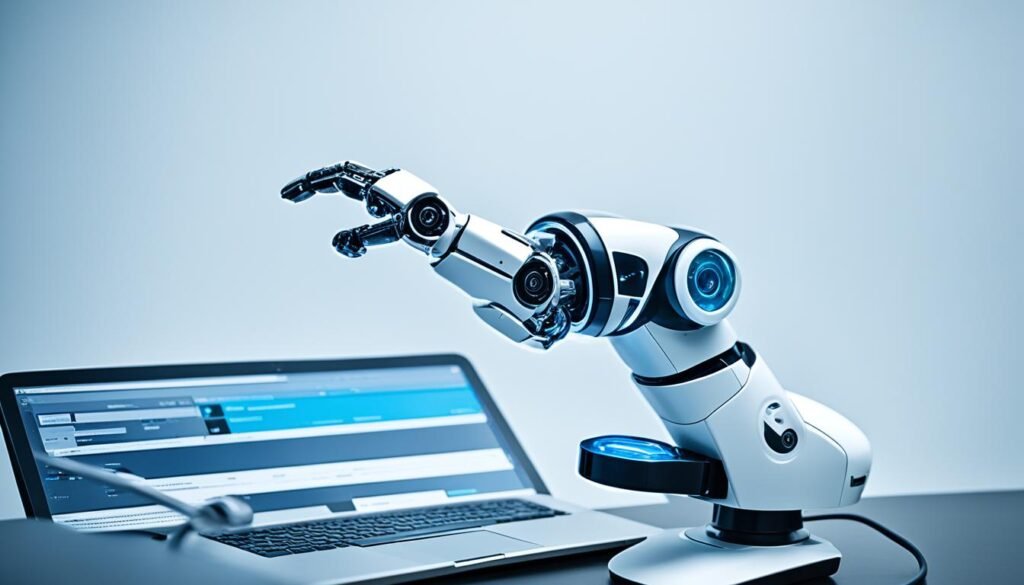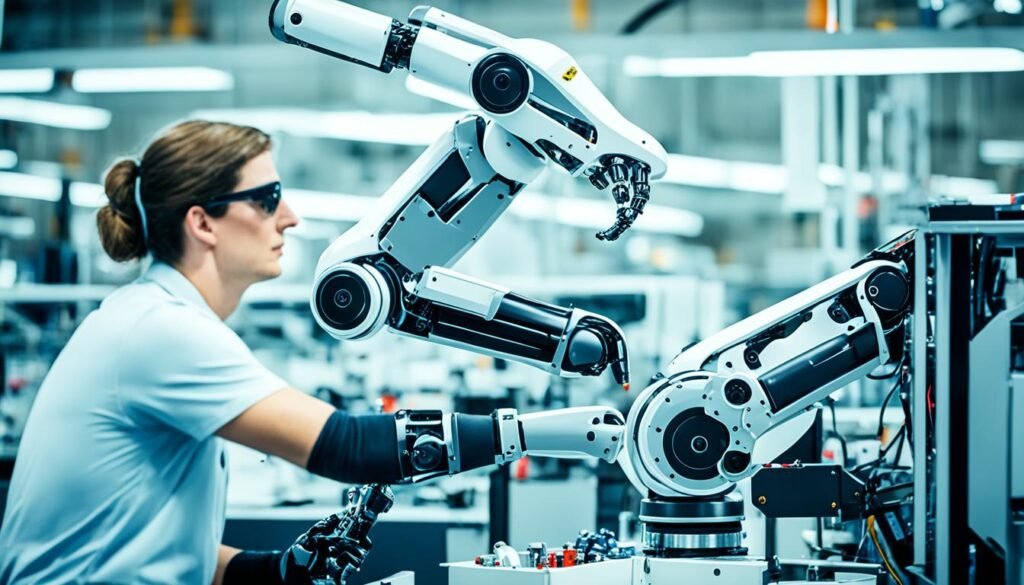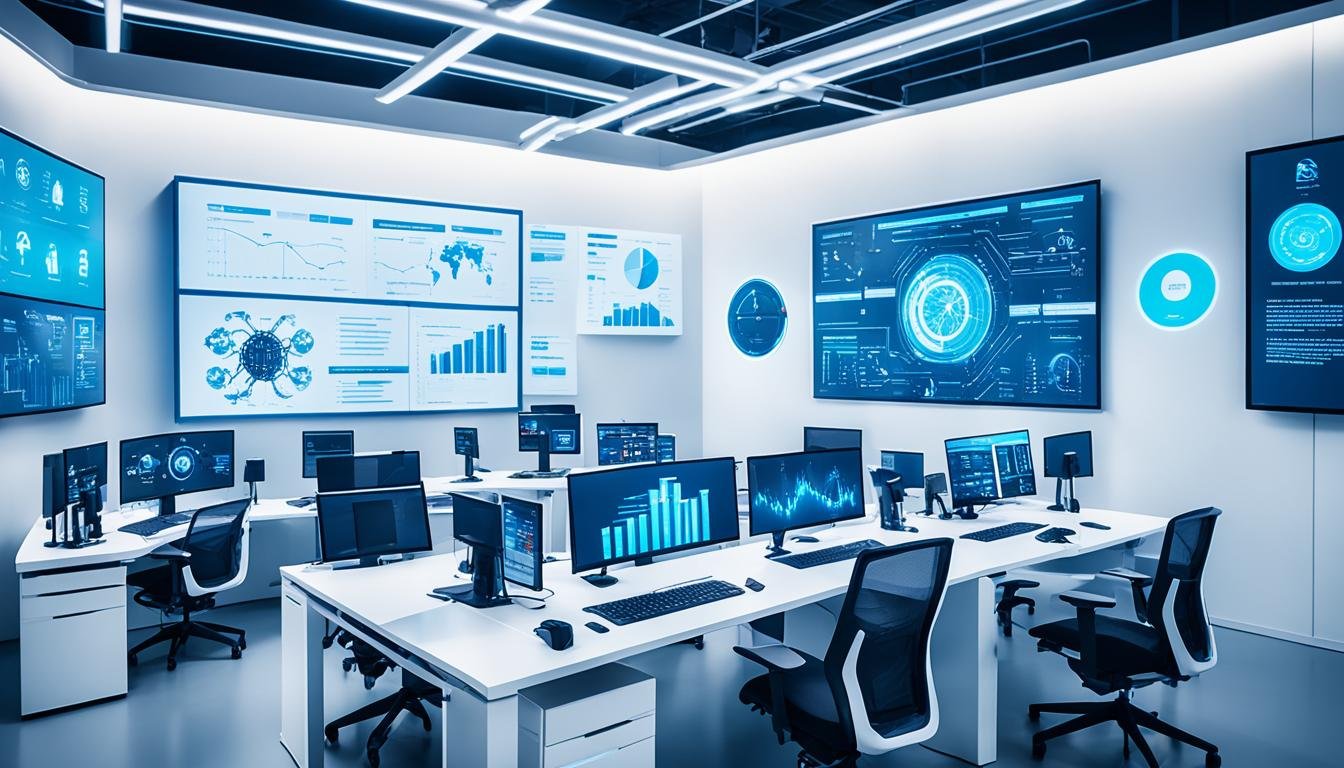AI is moving fast, making us wonder if it can manage and run a business. Experts say AI will be key in business, making decisions, and even starting new companies. A recent survey found many top bosses think AI will change their companies a lot in the next three years.
AI is changing how businesses work, from handling back-office tasks to talking with customers and staff. As AI gets better, it will deeply change how we manage and start businesses. This article will look at how AI is changing the business world. We’ll see how it’s affecting daily tasks and long-term plans.
Key Takeaways
- AI is becoming a key tool for businesses, changing many industries.
- AI is changing how businesses work, making tasks automated and smarter.
- Experts believe AI will greatly change companies in the next three years.
- AI helps with important business tasks, like automating work and talking to customers and staff.
- There’s a lot of talk about how AI will affect jobs and how much it will automate tasks.
What is Artificial Intelligence (AI)?
Artificial Intelligence (AI) is a fast-growing field. It includes computer systems that can do tasks that usually need human smarts, like learning, solving problems, and making decisions. Companies are now using AI to boost innovation, work more efficiently, and make customers happier.
Machine Learning (ML) and Deep Learning
At the heart of AI are machine learning (ML) and deep learning. Machine learning lets computers learn from data and make predictions or choices on their own. Deep learning is a type of ML that uses artificial neural networks for complex tasks like spotting fraud or recognizing images.
Examples of ML and Deep Learning
- Predictive maintenance in manufacturing: ML algorithms look at sensor data to guess when equipment might break down. This lets companies fix things before they stop working, cutting down on downtime.
- Self-driving car technology: Deep learning models use data from sensors to figure out how to drive, spot obstacles, and make quick decisions.
- Personalized product recommendations: ML models check out what customers like and suggest products or content that fits their tastes, making shopping better.
As AI keeps getting better, companies are finding new ways to use these technologies. They’re getting ahead, working more efficiently, and serving customers better.
| Technology | Definition | Key Applications |
|---|---|---|
| Artificial Intelligence (AI) | A broad field that encompasses computer systems capable of performing tasks that typically require human intelligence. | Improving efficiency, enhancing customer experiences, and driving innovation across various industries. |
| Machine Learning (ML) | The development of algorithms that enable computers to learn from data and make predictions or decisions without being explicitly programmed. | Predictive maintenance, personalized recommendations, fraud detection, and more. |
| Deep Learning | A more sophisticated form of ML that utilizes artificial neural networks to engage in nonlinear reasoning for complex tasks. | Self-driving car technology, image recognition, natural language processing, and advanced decision-making. |
How AI is Transforming Business
AI isn’t a replacement for human smarts. It’s a tool that can analyze data way faster than we can. AI software can look at data and suggest actions to humans, making business decisions easier. The impact of AI on business is huge, with the market expected to hit over $500 billion by 2024. This shows how big the growth potential is for companies using these new technologies.
AI Applications in Business
Businesses in many fields are using AI to improve and stay competitive. Some top AI uses in business include:
- Machine Learning (ML) and Deep Learning: These AI technologies get better over time by processing more data. They help businesses grow and give deep insights, which is key for things like spotting fraud and making self-driving cars.
- Cybersecurity and Fraud Detection: Financial and government groups use AI to catch and stop theft and fraud. This makes them safer thanks to AI.
- Customer Relationship Management (CRM): Retailers use AI to look at customer buying habits. This helps them make better marketing plans and sell more by offering what customers want.
- Internet Research and Digital Assistants: AI tools help businesses find data from different sources. This lets them understand sales trends and manage stock better in real-time.
- Automation and Operational Efficiency: AI automation cuts down on mistakes and boosts work quality. This leads to more productivity for companies. AI also watches and analyzes how businesses run, finding trends and oddities to make them run better and more profitably.
AI is changing many industries like the automotive, bioscience, education, finance & banking, healthcare, and IoT. Each one is using AI for specific improvements. For example, in cars, AI is making self-driving vehicles. In healthcare, AI is creating medical apps for better care. And in cities, AI is helping build smarter ones.

“The impact of AI on the business landscape is undeniable, with the AI market projected to exceed $500 billion in 2024, showcasing substantial growth potential for companies that leverage these transformative technologies.”
Machine Learning in Business Operations
In today’s world, machine learning (ML) is changing how businesses work. It uses artificial intelligence (AI) and ML to make processes better, improve decisions, and boost performance.
ML is making a big difference in business operations. Companies use it to make things like logistics, hiring, IT, and customer service better. For instance, enterprise cognitive computing (ECC) combines AI, ML, and human skills for quick data analysis and smart decisions.
ML helps process data faster and more accurately, helping businesses make quicker and smarter choices. AI in IT can also cut costs by automating tasks and spotting problems early, reducing downtime.
- AI and ML are changing how we hire by automating resume checks and sorting, making hiring more efficient.
- In customer service, AI chatbots and virtual assistants give fast answers and pass on tough questions to humans, ensuring great service.
AI and ML boost human skills, making things more efficient, giving better data access, and helping with decisions. The global AI market is growing fast, expected to increase by 40.2% from 2021 to 2028. Using these technologies will be key for businesses wanting to stay ahead.
“The power of AI and machine learning lies in making humans better at their jobs by improving efficiency and data access.”
By using machine learning in business operations, companies can gain many benefits. These include better logistics, hiring, IT, and customer service. As AI and ML grow in use, companies that use them well will do well in the changing business world.
AI in Cybersecurity and Fraud Detection
In today’s digital world, artificial intelligence (AI) is key in fighting cybercrime and fraud. AI acts as a watchful eye, looking for patterns in data to stop cyberattacks and fraud.
AI is great at quickly going through lots of data to find things that might not be noticed by people. It looks for things like strange login attempts or unusual transactions. When it finds something, it alerts companies right away.
AI in fraud detection is also a big help, especially in finance. It checks transaction patterns and customer actions to catch fraud. This helps protect businesses and builds trust with customers.
AI in cybersecurity and fraud detection has many benefits. A 2023 report by DigitalOcean found that 37% of companies upped their cybersecurity spending. Also, fraud can cost companies up to 5% of their yearly revenue, which is about $117,000 on average.
As technology gets more complex, using AI in these areas will be even more important. AI helps businesses stay ahead, keep their assets safe, and keep customers’ trust in a world full of threats.

“AI systems in banking monitor accounts continuously for signs of fraud, such as unusual large withdrawals or unexpected overseas transactions.”
AI systems for detecting fraud are also more accurate than manual checks. They get better over time by learning from new data. This means businesses can save money by stopping fraud and needing fewer people to check things.
But, using AI in these areas has its challenges. Keeping data clean and available, working with current systems, and making sure it doesn’t bother customers are some of the issues. Keeping up with new fraud tactics is also a challenge.
Even with these challenges, AI is a powerful tool for businesses. It helps them stay safe, protect their assets, and build trust with customers. This is key to doing well in the digital world.
can ai run a business
Artificial Intelligence (AI) is changing how businesses work, especially in customer relationship management (CRM). AI is making a big difference here by offering personalized experiences and making customer interactions smoother.
AI is improving CRM by sending personalized messages and offers. It looks at customer data to send messages and suggestions that fit what each customer likes. For instance, AI can send mortgage renewal messages or offers based on what customers have done before.
AI is also changing how customer service works. AI chatbots and virtual assistants can quickly answer common questions, letting human customer service people focus on harder issues. This makes customers happier and helps the customer service team work better.
AI is also great at predictive analytics in CRM. It looks at customer data to find patterns and trends. This helps businesses know what customers might need before they ask. This can make customers more satisfied, loyal, and can even help businesses grow.
In summary, AI is changing CRM by offering personalized experiences, automating customer service, and using predictive analytics. This helps businesses give great customer experiences and grow.
| AI-Powered CRM Features | Benefits |
|---|---|
| Personalized messaging and offers | Improved customer engagement and loyalty |
| AI-powered chatbots and virtual assistants | Enhanced customer service efficiency and responsiveness |
| Predictive analytics | Anticipate customer needs and proactively address them |
“AI-powered CRM is transforming the way businesses interact with their customers, delivering personalized experiences and streamlining customer interactions.”
AI in Internet Research and Digital Assistants
The use of artificial intelligence (AI) is changing how we search online and manage our tasks. AI search algorithms go through lots of data to find patterns in what users do. This makes search results more relevant and helps small businesses find their audience better.
Digital assistants are a big part of this change. AI chatbots use natural language and machine learning to act like personal assistants. They help with emails, calendars, and give tips to make business tasks easier. These AI assistants are always there and get better over time, changing how we use technology and find information.
- AI algorithms look at search patterns to give better results, helping small businesses find their customers.
- AI chatbots and digital assistants can do many tasks, like managing emails and organizing calendars.
- Using AI in searching and digital assistants makes our lives and businesses more efficient, personalized, and convenient.
“AI is fundamentally changing the way we interact with technology and access information. From personalized search results to intelligent virtual assistants, the impact of AI is reshaping the digital landscape.”
As AI becomes more common in searching and digital assistants, businesses that use it will improve customer experiences and operations. They will also stay competitive in the digital world.

The Future of AI in Business
The future of AI in business looks amazing. Experts say AI will keep getting better, doing more everyday tasks. It will also make things we thought were impossible happen, like self-driving cars.
AI Handling Everyday Tasks
AI will change our daily lives in big ways. For example, it might change a restaurant’s music and decor based on what customers like. This is just the start of how AI will change our lives and work.
AI Making the Impossible Possible
AI won’t just make things better; it will make the impossible happen. Accenture says AI will make workers twice as efficient and increase profits by 38% by 2035. Gartner says companies using AI will have more market share and be 10 times more efficient than others in 2024. The AI market is expected to grow a lot, showing how big an impact it will have.
| AI Impact | Statistic |
|---|---|
| Cost Reduction | AI is expected to drive a 37% reduction in costs for businesses in 2024. |
| Revenue Increase | 63% of companies that adopted AI into their operations in 2023 reported revenue increases. |
| Workforce Efficiency | Accenture predicts that artificial intelligence in business operations will double the efficiency of the workforce and boost profitability by an average of 38% by 2035. |
| Market Share | Gartner reports that companies incorporating AI are projected to have twice the market share and 10 times more efficiency than their competitors in 2024. |
| Customer Interaction | In 2024, it’s estimated that businesses will interact more with customers through AI-powered communication channels than human-led efforts. |
| Customer Relationship Management | AI is projected to manage 85% of business relationships with customers in 2024. |
| Economic Impact | It’s expected that AI will boost the global economy by $15.7 trillion in 2024 alone. |
The future of AI in business is exciting. It will handle everyday tasks and make the impossible possible. As AI grows, businesses that use it will do well in the future.
Impact of AI on the Workforce
As [AI transforms industries](https://ssir.org/articles/entry/ai-impact-on-jobs-and-work), many worry that technology will take over human jobs. But, the debate on AI’s effect on work is ongoing. Some say AI will replace many jobs, while others believe it will make human skills better.
Statistics show that nearly 40 percent of global jobs could be affected by AI. In rich countries, about 60 percent of jobs might face AI challenges. In poorer countries, it’s 26 percent. But, in rich countries, half of the jobs at risk could get better with AI, making them more productive.
But, AI’s effect isn’t all good news. It could make things worse for some people, making the rich richer. The IMF’s AI Preparedness Index shows that rich countries are ready for AI. Singapore, the United States, and Denmark are leading.
To tackle these issues, we need to focus on AI innovation and strong rules in rich countries. In poorer countries, invest in digital skills and infrastructure. AI in hiring can also help make recruitment fairer and more inclusive.
As AI changes work, companies must think about how it affects people. Finding a balance between tech and worker skills is key. This way, AI can improve human abilities and make the future better for everyone.

“AI tools assist in discovering high-potential candidates beyond traditional sources, fostering diversity in hiring.”
Ethical Considerations in AI Adoption
As AI technologies grow, we must think about the ethical sides of using them. A big worry is AI making biases worse. If AI learns from biased data, it can make problems worse for some groups.
Another issue is AI not being clear or responsible in its choices. We can’t always understand how AI makes decisions. So, it’s hard to hold it accountable. Companies need to make sure humans know their role in AI and have ways to fix things when they go wrong.
AI adoption brings up many ethical questions, like privacy and job loss. For example, AI could use our personal info without our okay. Or, it could spread false info, hurting society.
To fix these problems, companies and leaders must work on rules for AI. They should focus on being open, responsible, and fair. This means using diverse data for AI, checking for bias, and making humans accountable for AI decisions.
By thinking ahead on AI ethics, we can make the most of these technologies. We can make sure the good parts go to everyone. Making AI responsible is key to trust, keeping society together, and making a future where AI helps us, not hurts us.
| Key Ethical Considerations in AI Adoption | Potential Risks | Mitigation Strategies |
|---|---|---|
| Algorithmic Bias | Amplification of existing biases, leading to discriminatory outcomes | Diverse and unbiased training data, algorithmic auditing, human oversight |
| Transparency and Accountability | Lack of explainability in AI-driven predictions and decisions | Transparency in algorithm design, clearly defined human responsibility, auditing mechanisms |
| Privacy and Security | Misuse of personal data, surveillance, and cybersecurity risks | Robust data governance frameworks, encryption, and user control over personal information |
| Job Displacement and Labor Market Disruption | Widespread unemployment due to AI automation | Workforce retraining, job transition assistance, and policies to support human-AI collaboration |
| Autonomous Weapons and Military Applications | Ethical concerns around the development and use of AI-powered weapons | International agreements and regulations for responsible deployment of AI in the military domain |
By tackling these ethical issues and managing risks, we can make the most of AI ethics. This way, we build trust and aim for a future where ethical considerations in ai adoption are key.
“The true test of the morality of a society is what it does for its children.” – Dietrich Bonhoeffer
Conclusion
AI is changing how businesses work and look to the future. It helps with cybersecurity, customer service, and automates tasks. This makes AI a key tool for all kinds of companies.
Now, over half of employees use AI every day. About 68% want their companies to use it more. As AI use grows, businesses that adapt will do well in the future.
But, we must think about the ethics of using AI. The World Economic Forum says up to 75 million jobs could be lost to AI. We need to find a way to use AI responsibly. This way, companies can use AI’s power without hurting their workers or communities.
FAQ
What is artificial intelligence (AI)?
AI is when computers do things that humans do, like learning and solving problems. It’s used a lot in business, especially with machine learning (ML) and deep learning.
What are machine learning (ML) and deep learning?
ML helps computers understand lots of data fast. Deep learning is a type of ML that uses neural networks for complex tasks, like spotting fraud.
What are some examples of ML and deep learning?
ML and deep learning are used in things like predicting when machines need maintenance and making self-driving cars.
How is AI transforming business operations?
AI is changing how businesses work by improving things like security, managing customer relationships, and finding information online.
How is machine learning used in business operations?
ML helps with managing energy use and maintenance by analyzing lots of data. It also makes insurance processes faster by spotting risks and fraud.
How does AI help with cybersecurity and fraud detection?
AI spots cyber threats by looking at data patterns. It helps prevent future attacks by tracing back to the source. This makes a company’s security stronger.
Can AI run a business?
AI is changing how companies manage customer relationships, making it more automatic. For example, it can send personalized messages about mortgage offers based on what customers have done before.
How does AI impact internet research and digital assistants?
AI changes how we search online by finding the most relevant information. It also helps with daily tasks through chatbots, like managing emails and calendars.
What is the future of AI in business?
AI will keep getting better at doing everyday tasks. It will also make things like driverless cars possible and change how we experience things, like adjusting music in restaurants based on what customers like.
How will AI impact the workforce?
Some worry that AI will take jobs away, but it’s not clear how much this will happen. Some think AI will make people’s jobs better, not worse. The effect of AI on jobs is still being debated.
What are the ethical considerations in AI adoption?
AI can make biases worse if they’re already there. It’s hard to explain how AI makes decisions, which can be a problem. Companies need to think about how to use AI in a way that’s fair and responsible.
